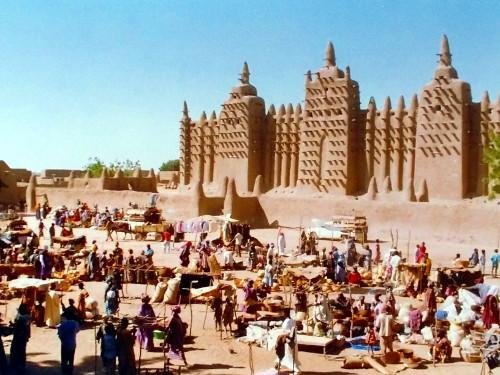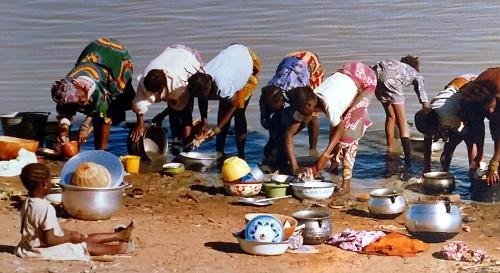In Pursuit of Adventure - Part 6, by @terresco (translated from French)
This is an authorized translation in English of a post in French by @terresco: A la poursuite de l'aventure 6
As my primary language is not English, there are probably some mistakes in my translation.
Remember that the person who speaks here is NOT me, Vincent Celier (@vcelier), but @terresco, a French guy.
The truck in which we had embarked was moving slowly in the direction of Timbuktu. We were no longer the actors of our progress, but the adventure was not over. To let ourselves be driven was a great pleasure, delivered from the apprehension of sinking in the sand, punctures and other failures that we could have undergone at the wheel of our Mercedes. The hot hours were long and uncomfortable, everyone locked in himself, sleeping if possible, to make them shorter. In the evening, sitting in the sand around a large pasta dish prepared by the drivers, we relive the beginnings of our adventure by telling it. Our public, having nothing to do but kill time, was ours. Our companions learned how we had financed, bought and refurbished the car but they were especially interested in our crossing of Algeria and the far north of Mali, closer to their daily lives. (See previous episodes).
A truck life
The drivers were Touareg and it was a new delight to discover their way of being. We knew this people popularized in the European imagination by the classic photo of a Tuareg warrior riding his great camel, a blue cheche washed with fresh air, a rifle in his hand. The reality we encountered was very different but no less interesting. Our Touareg were workers, drivers, assistant drivers or apprentices, mechanics with various skills. They crisscrossed the slopes to earn a living, bringing back food for their families.
Gradually taking our place in the convoy we helped as best we could, appropriating the way of doing and being of our fellow travelers by making us useful. Speaking a lot and asking many questions, we arrived at the goal without realizing it, transforming a journey that some might have found long and painful into a source of discovery and new knowledge. The adventurers became travelers.
We were in front of Timbuktu, the pearl of the desert. No sign of entrance as in our European towns or villages but, without any doubt, we entered the mythical city. One of the drivers had offered us to stay with his family during our stay and we agreed. We had to wait two days for the departure of another truck, which would take us to Mopti and then Bamako where we would look for a return ticket. Although late at that time, back to school was more than close.
Timbuktu, at the heart of the myth
In the meantime we were going to explore the city with 333 saints. Three types of population mix: the Tuaregs, the Songhais and the Arabs. Each of them will tell you that they are the creators of the city, supporting their idea with a well-documented story. It is in the fifteenth century that Timbuktu had its hour of glory and manufactures its legend. It is the construction of the mosque and the Islamic University which has developed then acquired a great reputation in West Africa which assures its new power. It had been becoming an important trade hub accumulating wealth.

We must admit that we were disappointed in Timbuktu, because we expected too much. Error of Boeotians because, for the record, Timbuktu was classified as World Heritage by UNESCO less than 10 years later. The richness of Timbuktu is hidden in its ancient manuscripts, preserved by the great families, in its mausoleums and tombs that were much later partly destroyed by the Salafist islamists.
Three days later neither news nor truck. We also realized that there was no truck making this journey, because of the ferry crossing the Niger River south of the city. We had to find another way. First we had to go to the port, 12 kilometers away. A river port of course.
In pursuit of civilization

The transportation was cheap but as soon as we were able, we change to a truck, faster and less uncomfortable. Two days later we were in Mopti where two solutions were available to us to continue. A bigger and more comfortable boat or bush taxi. We chose the second because no one could tell us when the boat was going to leave, it did not even happen. Like most African rivers, Niger is wide but shallow. Sandbanks make complex progress and the slightest mistake can cost days.
The bush taxi is an experience you have to live at least once in Africa. It's a collective taxi. Slow, crowded, noisy, uncomfortable, he stops constantly. There are certainly scheduled stops but the driver will stop at each request, shipping an additional passenger in a space where there are already 10 too many. It happens that a passenger stays only for one or two kilometers requiring the vehicle to make two successive stops. But it does not matter how profitable it is and these small profits probably stay in the driver's pocket. Goats, chickens and other bulky baggage are usually placed on the roof.
Several days later we were in Bamako, the discussions with the other passengers had given us a glimpse to a lot of African realities. I remember being moved by the notion of ethnicity and various languages. No sooner had you learned to say hello or thank you in the language than the progress of the slow moving taxi, you have been propelled into another culture.
In Bamako we went to look for a travel agency. We quickly realized that ticket prices to return to France were very expensive, Bamako was probably not a tourist destination in those days. Someone suggested to us that prices would be divided by two or even three if we went to Dakar. Never mind, at age 18, living our daily life, unaware of the passing time, a few more weeks of adventure was not a problem.
Continue to Part 7
-- @terresco
This post completly bound me till the end to staywith it. Going to read previous posts too.
Wow so interesting and amazing story really like it...
keep it up.
i think you are very hard working person.its realy
Get More Upvote - FREE
steem.link/sbd
Get 0.1 Steem free on signup !